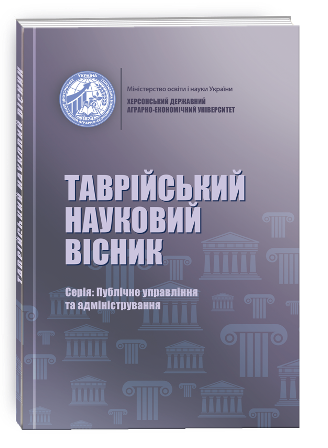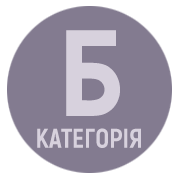DESTABILIZATION, STABILIZATION, CONTROL OF THE INFORMATION SPACE WITH THE HELP OF STATE ADMINISTRATION MECHANISMS
DOI:
https://doi.org/10.32782/tnv-pub.2024.5.5Keywords:
public administration, information space, information warfare, strategic communications Russian aggression, information and psychological influenceAbstract
In today's environment, an extremely wide range of tasks is realized through information activities. First of all, in the field of marketing, advertising, image promotion, lobbying at the level of governments and in other fiercely competitive areas. Every day, there are information attacks committed by a wide variety of actors and measures to respond to them. Some of these issues are addressed by crisis communication measures. On a larger scale, there is the issue of strategic communications. In Ukraine, where the State Defense Forces have been repelling Russian aggression for ten years and the large-scale invasion of Russian military-terrorist groups has been going on for three years, accompanied at all stages by information and psychological operations, influence operations, and elements of cognitive warfare, the question arises as to whether it is correct to speak of any government communications other than crisis communications, since the acute crisis has not stopped for years. At the same time, psychologically, an acute crisis that does not stop for a very long time causes a kind of «addiction» in a significant part of the audience, and due to the relevant defense mechanisms of the psyche, such audiences stop «noticing» it, which affects the approaches that should be used in communication with such audiences. In addition, it seems obvious that when attacking, it is necessary to destabilize the enemy's information space and achieve a destabilizing effect in the cognitive sphere in relation to the enemy's approved target audiences, while the situation in one's own society and information space, which the enemy and other actors are constantly trying to undermine, must be stabilized. But this is also not always true, since excessive reassurance of one's own audiences, especially if not only true information is used for its implementation or elements of the truth are taken out of context, ultimately leads to an accelerated «getting used» of society to war and, as a result, to a weakening of its ability to provide the necessary resistance and assistance to the state defense forces. In addition, any public administration measures related to the control of the information space should be implemented within the framework of the legislation of Ukraine and in compliance with democratic principles, which completely excludes legally and almost completely in fact such tools as censorship, propaganda, influence operations on its territory or those that can mislead its own audiences other than enemy ones and cause damage to its own audiences. In the context of the intense cognitive warfare that accompanies Russia's large-scale invasion of Ukraine, these issues require detailed research. The quality of such research and the implementation of its practical results depends not only on the effectiveness of the functioning of public administration mechanisms in the field of information space security, protection of information security of Ukraine as a state and information security of persons residing in Ukraine, but also on the physical health of representatives of target audiences to whom the enemy directs its destructive information and psychological influence, Ukraine's ability to win the war and, ultimately, the psychological and physical survival of the Ukrainian people. The purpose of the proposed study is to find ways to improve the efficiency of public administration mechanisms in the field of information space security through the analysis of historical and modern strategies for controlling the information space by state institutions (in particular, stabilization and destabilization of the information environment). The objectives of the study is to analyze historical sources, scientific works, official reports and journalistic materials which provide an opportunity to study the problems of functioning of public administration mechanisms in the field of information space security protection in the context of repulsion of the Russian large-scale invasion by the Ukrainian Defense Forces with intensive use of information space control measures (in particular, stabilization and destabilization of the information environment) by various actors. The scientific novelty of the study and its results lies in a comprehensive consideration of the problematic issues of modern public administration in the field of protecting the security of Ukraine's information space related to the active conduct of information actions by participants in the information space filling within the framework of information space control strategies (in particular, stabilization and destabilization of the information environment) in the context of repulsion of the Russian large-scale invasion by the Ukrainian Defense Forces. Methodology. The following methods of scientific research were used in the course of the study: historical, comparative analysis, retrospective analysis, analysis and synthesis, deduction, induction, systemic and structural, linguistic, and formal logical. The conclusions suggest that: To take measures to ensure proper conditions for the implementation of professional activities of journalists and measures to monitor their compliance with the standards of professional activity of journalists; To take measures to implement fleeting (operational) opportunities to gain cognitive advantage, reduce the effectiveness (level the consequences) of hostile destructive information and psychological influence focused on effects in the cognitive dimension of the information space, using the analytical and creative capabilities of its own personnel who are in the civil (military) service and specialize in the implementation of information and psychological influence, while observing the rule prohibiting misleading its own population; To take measures to enable civil society institutions willing to contribute to the defense of Ukraine to coordinate their efforts to counteract hostile destructive information and psychological influence with relevant state institutions, while observing the rules for the protection of state secrets and confidential information; To prevent violation of the principles of democratic governance, take measures to gain information (cognitive) advantage over the enemy by consolidating the efforts of the state leadership, the Armed Forces and civil society of Ukraine in achieving a common goal – victory over the enemy; Given the rapidity of processes in the information space in the context of cognitive warfare, to formulate and consolidate at the level of regulatory legal (normative) acts protocols of actions for personnel implementing the functioning of public administration mechanisms in the field of information space security protection in such a way as not to restrict the creative freedom of the relevant personnel, but at the same time to exclude opportunities for abuse and to define as specifically as possible the scope of powers and possible forms of their own information actions in view of the operational situation.
References
Гіга В. Методи та моделі управління інформаційно-психологічним впливом у соціальних мережах. // [Електронний ресурс]. Дисертація. Київ. 2023. 178 С. URL: http://vchenarada.nau.edu.ua/wp-content/uploads/2023/10/Disertatsiya_Griga-Vladislav.pdf. (дата звернення 28.07.2024).
Скулиш Є., Жарков Я., Компанцева Л., Остроухов В., Петрик В., Присяжнюк М. Історія інформаційно-психологічного протиборства. // [Електронний ресурс]. Науково-видавничий відділ Національної академії Служби безпеки України. Київ. 2012. 212 С. URL: https://moodle.znu.edu.ua/pluginfile.php/262605/mod_resource/content/1/%D0%86%D0%9D%D0%A4%D0%9E%D0%A0%D0%9C%D0%90%D0%A6%D0%86%D0%99%D0%9D%D0%95%20%D0%9F%D0%A0%D0%9E%D0%A2%D0%98%D0%A1%D0%A2%D0%9E%D0%AF%D0%9D%D0%9D%D0%AF_%D0%9F%D0%86%D0%94%D0%A0%D0%A3%D0%A7%D0%9D%D0%98%D0%9A.pdf. (дата звернення 28.07.2024).
Іванова С., Талагойда С. Кризова комунікація українських бібліотек на сучасному етапі. // [Електронний ресурс]. Innovative ways of learning development Abstracts of X International Scientific and Practical Conference Varna, Bulgaria. 2023. С. 78–82. URL: https://eu-conf.com/wp-content/uploads/2023/03/Innovative-ways-oflearning-development.pdf#page=79. (дата звернення 28.07.2024).
Бєлєвцева В. Основи правового регулювання інформаційної сфери у державі Ізраїль. // [Електронний ресурс]. Інформація і право. 2024, № 1 (48). С. 162–169. DOI: https://doi.org/10.37750/2616-6798.2024.1(48).300802. (дата звернення 28.07.2024).
Боровик М. Протидія диверсійно-розвідувальним групам противника підрозділами Національної поліції України в умовах дії правового режиму воєнного стану // [Електронний ресурс]. Право і безпека. 2024, № 1. С. 152–162. DOI: https://pb.univd.edu.ua/index.php/PB/article/view/796/632. (дата звернення 28.07.2024).
Яременко С. Технології інформаційних війн: операції під фальшивими прапорами в російсько-українських взаєминах. // [Електронний ресурс]. Topical aspects of modern scientific research. Proceedings of X International scientific and practical conference. Tokyo, Japan. 2024. С. 476 – 482. URL: https://www.researchgate.net/profile/Volodymyr-Tkach-3/publication/381408432_INTEGROVANI_HIMIKO-MATEMATICNI_ZADACI_V_BRAZILSKOMU_STILI_NA_PSIHOLOGICNU_TEMATIKU_NA_TEMU_UKRAINSKIH_FRAZEOLOGIZMIV/links/666c1085b769e7691933ac68/INTEGROVANI-HIMIKO-MATEMATICNIZADACI-V-BRAZILSKOMU-STILI-NA-PSIHOLOGICNU-TEMATIKU-NATEMU-UKRAINSKIH-FRAZEOLOGIZMIV.pdf#page=476. (дата звернення 28.07.2024).
Семененко О., Водчиць О., Толок П., Митченко С., Гетьман А., Тарасов О. Основні теоретичні і практичні аспекти ведення проксі-війн та гібридних воєн у сучасній світовій геополітичній та безпековій обстановці: історія, теорія, практика, форми та способи, досвід для України. // [Електронний ресурс]. Journal of Scientific Papers «Social Development and Security». 2023, №3. С. 1–23. DOI: https://doi.org/10.33445/sds.2023.13.3.1. (дата звернення 28.07.2024).
Гайович Г., Шихненко К., Арехтейчук О. Кризова комунікація: зарубіжний досвід і реалії України. // [Електронний ресурс]. Науковий вісник: Державне управління. 2023, № 2 (14). C. 134–161. DOI: https://doi.org/10.33269/2618-0065-2023-2(14)-134-161. (дата звернення 28.07.2024).
AJP-3.10.1(A) Allied joint doctrine for psychological operations. // [Електронний ресурс]. 2007. URL: https://info.publicintelligence.net/NATO-PSYOPS.pdf. (дата звернення 28.07.2024).
NATO standard AJP-3.10.1 Allied joint doctrine for psychological operations Edition B Version 1 With UK national elements. // [Електронний ресурс]. 2014. URL: https://assets.publishing.service.gov.uk/media/5a80ce48e5274a2e87dbbecb/20150223-AJP_3_10_1_PSYOPS_with_UK_Green_pages.pdf. (дата звернення 28.07.2024).
Доктрина зі стратегічних комунікацій Збройних Сил України ВПК 10-00(49).01. // [Електронний ресурс]. 2020. URL: https://sprotyvg7.com.ua/wp-content/uploads/2022/04/%D0%92%D0%9A%D0%9F-10-0049.01-%D0%94%D0%BE%D0%BA%D1%82%D1%80%D0%B8%D0%BD%D0%B0-%D0%B7%D1%96-%D1%81%D1%82%D1%80%D0%B0%D1%82%D0%B5%-D0%B3%D1%96%D1%87%D0%BD%D0%B8%D1%85-%D0%BA%D0%BE%D0%BC%D1%83%D0%BD%D1%96%D0%BA%D0%B0%D1%86%D1%96%D0%B8%CC%86.pdf. (дата звернення 28.07.2024).
Якуба І. Спаліть свої «Пулітцери» для кого із західних медіа ракетний удар по «охматдиту» став новиною третього плану. // [Електронний ресурс]. 2024. https://imi.org.ua/monitorings/spalit-svoyi-pulittsery-dlya-kogo-z-zahidnyhmedia-raketnyj-udar-po-ohmatdytu-stav-novynoyu-tretogo-i62379. (дата звернення 28.07.2024).







